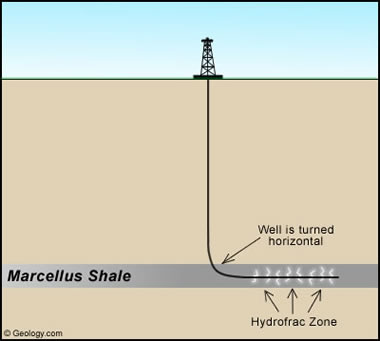Range Resources submitted its first voluntary disclosures form of Marcellus Shale hydraulic fracturing to the Pennsylvania Department of Environmental Protection (DEP) on August 12, but is this enough to ensure responsible development of this natural gas source and protect PA’s water supply?
The Marcellus Shale is a Middle Devonian-age black, low density, carbonaceous (organic rich) shale that occurs in the subsurface beneath much of Ohio, West Virginia, Pennsylvania and New York. In layman’s terms it is an extraordinary resource of natural gas causing a lot of debate in states where it could potentially be extracted.
Why the controversy? The method of extracting that gas could prove detrimental if left unchecked. A relatively new and controversial extraction process called hydraulic fracturing or fracking could pollute sources of the Delaware River that supplies Philadelphia’s water. Hydraulic fracturing entails a vertical drill moving horizontally to get the gas bound up in the rock and then millions of gallons of water mixed with toxic chemicals and sand being forced into the shale fracturing it; whereby making the gas pour out.
Range Resources Corporation one of the first companies on the scene to begin developing western PA’s source of natural gas drilled a Marcellus well in Washington County, Pennsylvania in 2003 and found a promising flow of natural gas. As of August 12, 2010 Range has committed to providing information on the environmental impact of hydraulic fracturing in the Marcellus Shale. Information on the first three Marcellus Shale wells in Pennsylvania that Range has hydraulically fractured since implementation of the voluntary initiative can be found on Range’s website. The purpose of this voluntary initiative is to provide landowners and citizens of Pennsylvania an accounting of the highly diluted additives used at each well site.
While the initiative has been met with supportive response from policy-makers, I cannot help but be skeptical about this new extraction method, the voluntary nature of the reporting and the effect on the 15 million people in Philadelphia who rely on the watershed which could potentially become contaminated. I hope voluntary disclosures are enough to keep the Marcellus Shale development safe.
Image Credit: chuckchuckchuck! via Flickr under CC license.








I am unable to find the disclosure info from either your links or directly from the RR web site.
There is some unclear language about “not available after 30 days, and then a lot of “page not found.”
It would be good if you could verify availability.
Stan Scobie, Binghaton, NY
Hi Stan!
The disclosure statements can be found at the bottom of MARCELLUS SHALE WELL COMPLETION REPORTS page. There is a separate link for each of the three wells already drilled. Let me know if you cannot find it, or would like more info.
Hi Stan!
The disclosure statements can be found at the bottom of MARCELLUS SHALE WELL COMPLETION REPORTS page. There is a separate link for each of the three wells already drilled. Let me know if you cannot find it, or would like more info.
A relatively new and controversial extraction process called hydraulic fracturing?
We’ve been fracing for years and a lot closer to the water tables then now. What’s going on now is far safer then in the past.
Actually, while vertical fracking with water has been done for a long time, even the industry’s own materials call the process of horizontal fracturing with the current mix of chemicals “new” technology. The effects of this horizontal fracturing, which essentially causes earthquakes in the shale and thus fractures the rock, is something that we don’t understand the impacts of at all.
Past fracking was typically done at the level of the aquifers to improve the flow of water in water wells.
is fracing safe or not? hopefully the e.p.a. or some goverment officials will keep an eye on this proccess, we do need this gas if we are to break the hold oil has on the country.keep drilling
While natural gas is cleaner burning than oil, the process of extracting the gas from the shale is dirtier than the process of extracting coal, in some cases. So, unless and until there is a clean way to extract this cleaner (not “clean”, mind you), it is not clear to me that we “need” this gas at all.
and how much are we spending on foreign oil? we need gas,wind, coal solar, capice
FYI for those who left all the great comments on this post. There is some news on the hydraulic fracturing front that I’ve posted here: Shareowner Resolutions prompt a new EPA study on Hydraulic Fracturing. Hope this fuels the discussion and thanks for reading!
FYI for those who left all the great comments on this post. There is some news on the hydraulic fracturing front that I’ve posted here: Shareowner Resolutions prompt a new EPA study on Hydraulic Fracturing. Hope this fuels the discussion and thanks for reading!